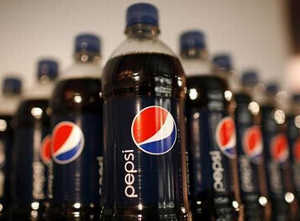 t investor Nelson Peltz, whose bid to break up PepsiCo Inc. (PEP) was rejected by management, fired back in a letter to the board yesterday, criticizing its “dismissive tone” and demanding operational changes.
t investor Nelson Peltz, whose bid to break up PepsiCo Inc. (PEP) was rejected by management, fired back in a letter to the board yesterday, criticizing its “dismissive tone” and demanding operational changes.Peltz, founder of Trian Fund Management LP, called on directors to meet shareholders without Chief Executive Officer Indra Nooyi and her management team. He also demanded that the company consolidate four headquarters facilities into two and disclose returns from bottler acquisitions.
The letter shows that Peltz doesn’t intend to retreat after months of pressuring the company to separate its beverage and Frito-Lay snack units to slash costs, allow more focused marketing and spur faster growth. The investor, whose fund owns 0.8% of PepsiCo, said the board doesn’t appreciate how frustrated shareholders are.
“Centralization of costs and power within corporate has eroded PepsiCo’s culture and impaired the competitiveness of its businesses,” Peltz and his Trian partners said in the seven-page letter.
Jim Wilkinson, executive vice president of communications for PepsiCo, said in an e-mailed statement that “major shareholders may consult with our presiding director at any time,” and that director, along with another independent director, “have already met with Trian without management present.”
Wilkinson said the board backed management’s decision that PepsiCo should remain an “integrated food and beverage company.”
Nooyi and director Ian M. Cook have rejected Peltz’s previous demands, with Cook saying in a letter last month that the proposal was “financial engineering” that would erode shareholder value.
Trian has met with eight of PepsiCo’s top 15 shareholders, Chief Investment Officer Ed Garden said yesterday in a phone interview. The fund will present its views to most of the biggest investors before starting town hall gatherings with smaller holders that Trian hopes will build support for its plan.
“We don’t go public like this very often,” Garden said. “In this case, there’s significant underperformance over a long period of time, coupled with a board and management team that, to date, has been dismissive with their shareholders.”
Peltz called on Purchase, New York-based PepsiCo to back up an earlier assertion that Trian used selective data to make its case and misused other information. Trian’s analysis is based on more than a year of research, and other big shareholders “agree that dramatic change is in order at Pepsi,” he said in an interview yesterday.
PepsiCo is bloated with billions of excess overhead costs that could be invested in beverage brands like Pepsi-Cola that have suffered from years of underspending to mask slowing growth and shrinking market share, Trian wrote. Atlanta-based Coca-Cola Co. (KO), meanwhile, has increased its share and outmaneuvered PepsiCo with greater innovation in products and packaging, Peltz said in the interview. Frito-Lay also would benefit from an independent management team, he said.
Trian asked for detail about PepsiCo’s $1.1 billion of unallocated costs and a breakdown of allocated corporate expenses. The company is “dripping, dripping, dripping with opportunity” to slash costs and refocus spending, Peltz said. PepsiCo also should disclose how much it has spent on direct marketing as a percentage of sales since 2005, the year before Nooyi became CEO.
The firm also challenged PepsiCo to prove that Nooyi’s acquisitions of bottlers weren’t a mistake and accused the company of damaging its crucial distribution network by losing volume share to rivals. The letter also questioned spending $240 million renovating the Purchase corporate headquarters.
Closing offices in Purchase and Chicago would cut costs for the separated snacks and beverages businesses, Trian said.
Trian wants “both companies to grow to their maximum potential,” Peltz said in the interview. “Right now, neither one is capable of doing that because they have an anchor around their necks that’s called corporate.”
Peltz also wants evidence from PepsiCo showing whether no-calorie soft drinks such as Pepsi Max are growing against similar offerings like Coke Zero, how Tropicana orange juice has performed against Coke’s Simply Orange and what has happened to the market position of Gatorade and SoBe.
“Despite poor performance in recent years, we believe the beverage business has great potential,” Trian wrote. “The business generates strong free cash flow and has the only North American distribution system that can compete head-on with Coke.”
Peltz, who previously pledged to take the case for a split directly to shareholders, said a recent informal survey by Sanford C. Bernstein & Co. showed 5% of responding current investors favor a separation.
Nooyi said last month that keeping the units together was in shareholders’ best interests and that the company was confident it could meet long-term profit goals. Nooyi said she’d cut expenses by $5 billion over five years starting in 2015, extending a plan already under way.
PepsiCo slipped 0.4% to $81.80 at the close in New York yesterday. The shares have fallen 1.4% this year, while the Standard & Poor’s 500 Index has slid 0.1%.





